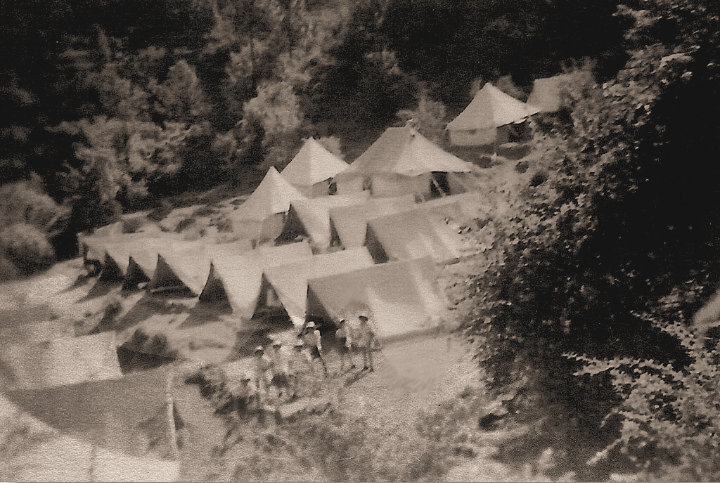The Annual Summer Camp

Traditionally held every year for about seven days around about Easter and, with a few exceptions, always at Dagroo, (with the kind permission of His Highness the Maharaja of Patiala, who owned the land). Boys of the senior Houses, 'Rangers' and Girl Guides went to 'camp' - but not of course, at the same time! Annual Camp, as a regular event in the School calendar was instituted in 1916 by Principal George D. Barne, who was said to have been influenced and inspired by Lady Honoria's account of the Lawrences' 'gypseying' [sic] with forty children of the Asylum, on a picnic to the same valley in April 1849. Thereafter, it became a regular and enjoyable feature of school life.
The chosen campsite was in a fairly even, fallow field near the Dharampur/Sabathu road bridge over the Dagroo valley, about 2Km from Dharampur. The tented accommodation, kitchens and latrines were set up in advance under the direction of the Chief Instructor and his staff. Everyone 'marched' down the old Dharampur/Dagshai bridle way to camp in noisy, excited groups. The requisite 'kit', baggage and rations, went down by 'chakra ' (bullock-cart) in the early days, and latterly by lorry via the main road. 'Grub' was cooked on open fires, and the fare was no better, or worse than one got from the cookhouse, back on the hilltop. Over the years, several deep pools were formed above and below the bridge for swimming by damming the stream with large stones, boulders etc. They were given names like "H-E Skunks", "HRS" and "Harts" which stuck for many years. Rambling, 'roaming', swimming and other outdoor activities were encouraged. However, there were strict rules published in School Orders regarding behaviour and respect for the local farmer's property, livestock and standing crops.
On the last Sunday of Camp, evensong or matins was sometimes held by the bridge. The officiating minister was usually the chaplain, but occasionally, "Boss", (the Principal) was known to take the service. The bridge was given the name "Choir Bridge" in about 1918 or 1919.
LRMS Summer Camps continued to be held until 1944, when, for reasons of economy and the rising cost of the war effort, the arrangements for 1944 were cancelled. The practice was later revived and the venue extended to other sites as far afield as Gaura and Sadhupul.
(LRMS Sanawar 1942-1947)
March 2003
Compiled from:
[1] The Journals of Honoria Lawrence, "India Observed 1837-1854"
[2] L.R.M.S. Orders No. 151, dated February 22nd, 1923.
[3] L.R.M.S. Orders No. 84, dated April 14th, 1944.